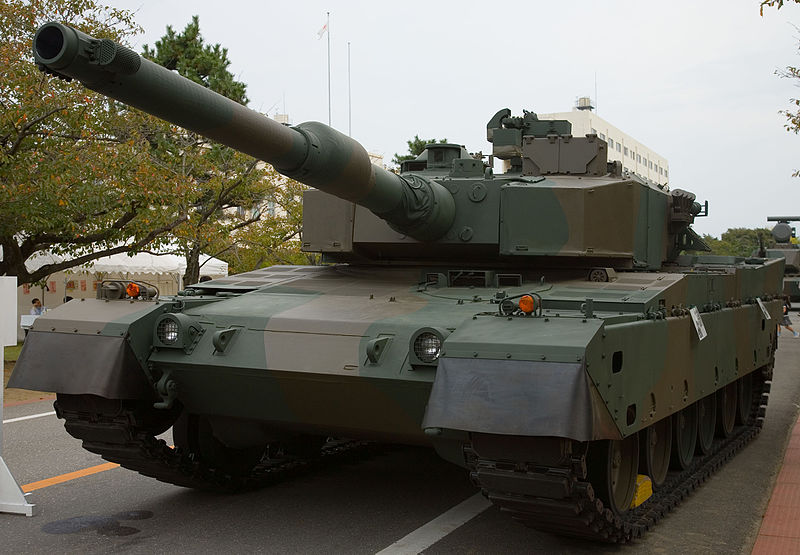Tokyo defence report annoys China
JGSDF Type 90 on display at the JGSDF Ordnance School in Tsuchiura, Kanto, Japan.
A new Japanese think tank report on Taiwan's defence and the Chinese military threat has received a thumbs down by Beijing for not respecting the 'One China' policy.
The seventh annual China Security Report, produced by the Ministry of Defence's core policy research arm, the Tokyo-based National Institute for Defense Studies (NIDS), provides detailed analysis of the Taiwan Strait security problem.
The report places most of the focus for creating instability in the region on China's military modernisation efforts, political destabilisation programmes aimed at Taiwan that include espionage, and Beijing's historical obstinacy.
The NIDS report, subtitled 'Change in Continuity: The Dynamics of the China-Taiwan Relationship,' argues that describing the China-Taiwan relationship as a status quo problem means maintaining the current faceoff between two political systems.
There is nothing static about the Cross-Strait relationship, said the report. Taiwan has gone from a brutal one-party dictatorship obsessed with losing the Chinese civil war to a thriving democracy not interested in any conflict beyond defending its coastline.
In response to the report, China's Foreign Ministry spokesperson Geng Shuang said on 24 February that Japan should 'exercise prudence on Taiwan-related issues' and 'refrain from sending the wrong signals to the Taiwan independence forces'.
The report cited the growing Taiwanese identity issue as a possible catalyst for conflict between China and Taiwan. Presidential and legislative elections in January 2016 saw the clear rejection of the Beijing-friendly Kuomintang Party (KMT) in favour of the once-outlawed Democratic Progressive Party (DPP). The election unsettled China's leadership, which had enjoyed the eight-year government of President Ma Ying-jeou who opened relations with China via numerous agreements and meetings.
The report said the DPP landslide was a 'clear rejection' of the KMT's 'conciliatory policy toward China'. Further, Ma's appeasement of Beijing's 'One China' policy and the Taiwanese sense of identity 'do not move in concert'.
The report no doubt aggravated China by pointing out that Taiwan's desire for unification with China was 'clearly in a pattern of decline'. China did nothing during Ma's tenure as president to reduce military tensions. For one, it passed the 2015 National Security Law making it legal to use non-peaceful means to force unification.
Second, opportunities for China to reward Ma for his efforts by reducing the 1,500 short-range ballistic missiles aimed at the island were dismissed by Beijing when the Taiwan president proposed it in late 2015.
The report cites numerous conflict triggers, but the top three are: a move towards Taiwan independence, internal disturbances in Taiwan and a weakened Taiwan military. The third trigger 'is practically a reality now'.
Recurring scandals within the Taiwan military, weakening discipline and morale, insufficient training, an inadequate sense of crisis and 'an environment in which little emphasis is given to the question of why military forces fight' have all taken their toll on the island's defences.
The recent accidental launch of a supersonic Hsiung Feng III anti-ship missile in the Taiwan Strait is just one of the numerous embarrassments the Ministry of National Defence has had to endure.
The reduction of military personnel as a percentage of the population further demonstrates the problem: in 1950 it was at 10.6; 1991 at 2.3; and 2016 at 0.9. The reduction is a result of political change, economic prosperity, lethargy, a gradual shift from conscription to an all-volunteer military and the drop of average service time (now down to four months).
The lessening of military preparation has created debate within the US on whether military support should be maintained for Taiwan. Is Taiwan the 'frontline of China's confrontation with the United States', or is it not?
If not, then why should the US continue providing weapons and training to the self-ruled island? Why continue to aggravate a growing muscle-bound military power? The report is honest enough to engage these questions.
Ominously, the report points to China's 'expansion' in the South China and East China seas. As China transitions towards a major maritime power, 'Taiwan's geographic importance has grown all the more, since it sits at the intersection of the East China Sea and the South China Sea and thus is China's threshold to the Western Pacific.'
The report asks if the US is willing or even capable of resisting China's sense of historical proportionality and destiny. The answers are disturbingly few in favour of regional stability.
(Source : shephardmedia.com)




Post A Comment
No comments :